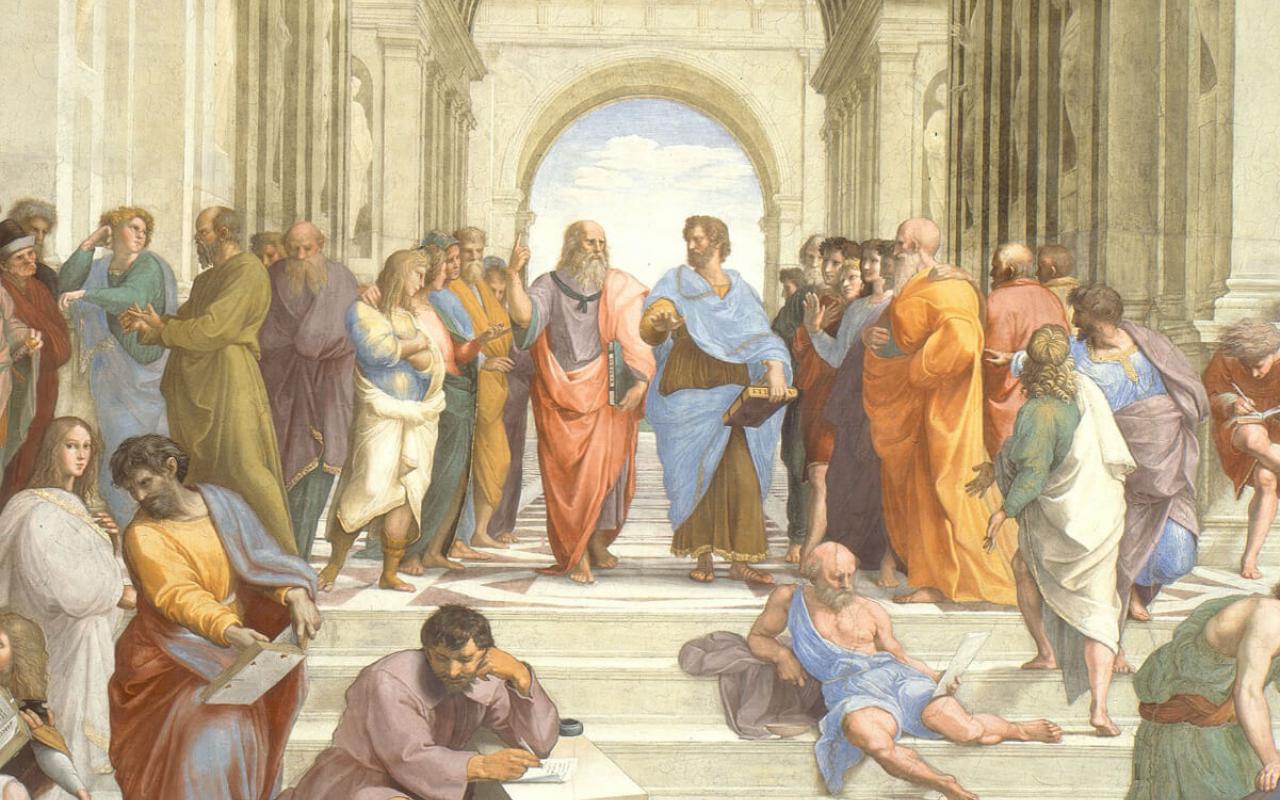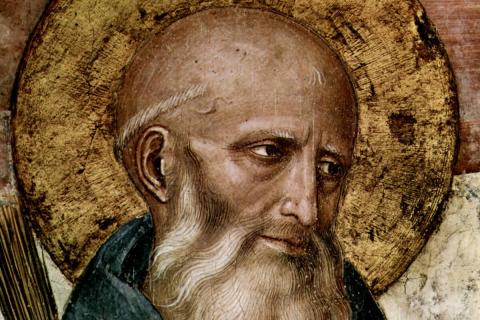
When faith and reason are properly understood, it becomes clear not only that do they not contradict, but also that faith has a central role to play in the project of higher education.
Catholic universities often speak of both faith and reason as important bases of their intellectual project. Each is understood to be a way to pursue and appropriate genuine knowledge. Given the unity of reality as a whole, the knowledge gained by each does not contradict or overthrow the knowledge gained by the other. Anyone seeking a clear formulation of the Catholic understanding of faith, reason, and how they interact can find many sources from the Catholic intellectual tradition that treat the question. Our purpose here is to provide a context that can help to explain why the relationship between faith and reason has been such a fraught question for the modern period, and to note the main lines of the Catholic understanding of their relationship.
1. Faith and reason in the modern mind
It is almost a given that we moderns consider faith and reason to engage two entirely different spheres of human experience. This is often just as true for people of faith as it is for those who are not religious. The dichotomy between faith and reason is expressed in different ways. It is sometimes said, for instance, that reason deals with what we know, while faith deals with what we feel; or that reason treats of matters that can be conclusively proven, while faith concerns conjecture and supposition; or that reason is objective, while faith is subjective; or that reason is scientific, while faith is personalistic; or that reason leads to genuine knowledge, while faith is mere opinion. However the relationship between faith and reason is described, it is commonly held that the university is properly a place for reason – that is, verifiable knowledge – and not for faith – that is, private opinions or subjective feelings and attitudes. According to such reasoning, while churches may be fine places, universities are not churches, and they address a completely different order of thought and endeavor.
If this view of things is taken as a starting point, the very idea of a Catholic university becomes problematic. Such a view finds the idea that Catholics might attend a university or that they might even found and run one no more problematic than the idea that Catholics might open and run a department store or tech company. According to the prevalent modern view of faith and reason, however, the specifically intellectual project of the university has nothing to do with the Catholic faith, and cannot, according to the very nature of things. To attempt to “impose” doctrines or dogmas that come from faith on the activity of the university, in this view, would be to put the search for knowledge in a straitjacket. Thus, campus ministries would be admitted to have a place, and the Church can be allowed to be present in order to provide for the religious needs and desires of those students who might wish it, but religious activity would be kept distinct from the intellectual and educative project of the university lest that project be compromised. The business of the university is verifiable facts: not personal opinion, subjective emotion, nor, emphatically, bigotry or prejudice.
2. Faith and reason in everyday life
The idea that faith and reason are entirely distinct processes, and that reason – understood in a particular way – is the only business of a university is not reasonable, despite surface appearances. Such an idea is based on a reduced concept of reason and a flawed understanding of faith, and it results in an often crippling limitation on the project of investigating and understanding all that exists. Before discussing the relationship between reason and faith in God, it can help to recognize the way faith and reason interact constantly in the way we go about normal, daily life.
A good deal of what we know comes to us not by personal verification or experience but rather by a kind of “faith” – that is, by placing our confidence in the authority or authorities from whom we have gained knowledge. Everything we know from books, from news sources, from websites, or from what other people have told us is taken on this kind of faith. While we could have discovered some of that information by ourselves, much of it lies beyond the possibility of our personal verification. Furthermore, almost all human action depends on some measure of faith. Every time we mail a letter, put money in a bank, eat at a restaurant, shop at a grocery store, or step into a plane, we are accepting as true what we cannot scientifically or logically prove: these people are not swindlers, this food is not poisoned, the captain of this aircraft is not a hijacker, and so on. We rely on this process of faith even though swindlers, poisonous foods, and hijackers actually exist.
Much of what it means to be a reasonable person and to act according to reason is to make sound judgments about what and whom we can trust – in other words, to know when to act on faith.
Once we note that we can hardly go through a day without many acts of faith of this kind, we might also note that the faith we are employing is usually not “blind,” and if possible, it should not be. If someone asked us why we thought China existed even though we had never been there and could not prove it scientifically, we would say that we have good grounds for our belief – so much so, in fact, that a person who denied China’s existence because he had never visited it personally and could not prove its existence empirically would be thought highly irrational. This all points to something fundamental about the nature of the relationship between faith and reason. Faith is intrinsically tied to reason, representing a reasonable response to certain aspects of thought and action. Reason itself demands that we regularly exercise well-grounded faith.
Faith is neither the opposite of reason nor the lack of it. When we exercise faith, whether in a bank, a restaurant, an airline, a teacher, or the word of a trusted friend, we exercise a type of reason: we are making a judgment on the basis of good “reasons,” as we usually put it. By the same token, if we refuse to put our money into an email scheme from Nigeria, or we avoid a particular restaurant because it has been closed numerous times for food poisoning, or we disbelieve a person who has consistently been found to be deceitful, we are withholding our faith with good reason. Much of what it means to be a reasonable person and to act according to reason is to make sound judgments about what and whom we can trust – in other words, to know when to act on faith.
Beyond the day-to-day necessity of exercising reasoned faith, we might also note that there are many aspects of reality that are of great importance to us but do not allow for strict scientific demonstration after the model of the natural sciences. Consider the following one example out of many: there is much to know and learn concerning how to make our way in life relationally with other people. We often speak of people who are good to others, who have a quick understanding, and who have wisdom for negotiating friendships, marriage and family, and work relationships. This is an important area of knowledge, demanding the use of a certain kind of reason – but not the same kind of reason as is needed to investigate the natural world. The man who addressed a family matter with his wife with the same type of rationality as he used to fix his car engine would be thought silly (especially by his wife). Both areas involve thinking and knowledge, and both demand reasoning, but they are knowledge and reasoning of different kinds.
3. The modern reduction of reason and its consequences
The remarkable success of applied technology based on the natural sciences has been gained through the application of a particular type of reason that involves mathematical, logical, and experimental verification based on the constant laws of physics. This development is a valid and impressive expression of the reasoning human mind, but it is not the only province of the rational search for understanding. There are many different ways of exercising reason. Aristotle long ago articulated one of the cardinal principles of clear thinking: one studies a thing according to the nature of the thing being studied. If we want to understand a particular type of rock, for instance, we might use a hammer or submit it to a chemical process. If we want to understand a butterfly, we had better come up with a different mode of investigation, or we will quickly learn little except that butterflies are destroyed by hammers and killed by chemicals. More significantly, if we want to bring the study of humans to a deep level, we will need a reasoning process that takes into account the nature of the human person in all its dimensions.
This proposition – which seems obvious – is surprisingly easy to forget or ignore. Dazzled by the results of natural science, many have decided that the mode of reasoning suited to the study of the natural world is the only legitimate rational method for any kind of study and is the only one that brings about genuine knowledge. Therefore, the conclusion is often drawn that this mode of investigation should be applied to all dimensions of reality. Whatever cannot be determined by this reasoning method, then, is not considered knowledge at all. This is a serious intellectual error. The study of the natural world deals with those aspects of reality that can be seen or measured and that are subject to universal laws of material causation. In matters of that kind, if something occurs once, it will inevitably occur again when the same material causes are present: the practice of laboratory experimentation and the so-called scientific method are based on this first principle. To apply this mode of reasoning to humans is to assume, usually without reflection, that humans have the same nature as inert matter and energy and are subject to the same kinds of causal necessities that will allow the predictive certainty upon which applied technology rests. This would mean, among other things, that humans have no free will, possess no soul, and have no spiritual dimension that may impinge upon consciousness and behavior. It is important to see that such sweeping assumptions are not – and cannot be – the fruit of any natural-scientific process; rather, they are assumed to be true at the outset. The practice of reason is thus reduced to a single mode of rational inquiry, relegating entire potential areas of study to the dustbin of “non-knowledge.” The consequence is a seriously skewed understanding of reality.
Faith and reason are like two wings on which the human spirit rises to the contemplation of truth.
An unfortunate result of this reductive process in the academy has been the attempt to squeeze all disciplines and all methods of study into this reduced notion of reason. The “human sciences” that involve the study of human life individually or corporately – such as psychology, sociology, anthropology, economics, history, and political science – need to justify their conclusions by attempting to be “scientific” in the same sense as physics or chemistry if they are to gain the prestige and authority that comes from being sources of genuine knowledge. The humanities – including philosophy, literature, and art, to say nothing of theology – are often tacitly relegated to the arena of opinion or taste rather than knowledge, leaving them seriously disadvantaged in the academic struggle for survival.
Despite the misconceptions mentioned above, the human faculty of reasoning has many different modes, depending on the aspect of reality one is studying. This was the founding rationale for various schools and departments in the university. There is mathematical reasoning, experimental reasoning, philosophic reasoning, moral reasoning, evidential reasoning, reasoning about social and political matters, and reasoning about human relationships. Furthermore, we can also discuss theological reasoning: reasoning about God that involves a rational practice of faith. Each mode of reasoning attempts to arrive at the truth of real things, but the manner in which that truth can be gained, the relative certainty of it, and the limits of our capacity to understand it differ depending on the aspect of reality under study. Knowing these different modes of reasoning, recognizing what is reasonable and what is not in the various areas of inquiry, and understanding the possibilities and limitations of various modes of reasoning serve as important and ongoing tasks of the university, as well as key qualities of a truly educated mind. These tasks have traditionally been gathered under the name “wisdom.”
4. Reason and faith in God
Augustine and Aquinas, two of the subtlest thinkers of Christian history and both champions of reason, often made comments like the following: “If you understood God, it would not be God you have understood” (St. Augustine, Sermon 56). This is an entirely rational statement. Philosophers of many traditions have arrived through philosophic reasoning at the conclusion that there is a Being beyond all others who is the creator of all that is and is the source of existence itself. If such an infinite and unlimited Being exists, it follows necessarily that humans, possessed of finite intelligence and experience, would be unable to understand that Being fully. The person who claims to understand God fully makes an irrational claim. Therefore, a certain mystery concerning God’s being and operations in the world is a necessary quality of reasonable thinking about God.
Because the human mind is limited in its apprehension of God, our reasoning powers can take us only so far. Almost all the great philosophies of the world have arrived at the existence of God in some form or other; nevertheless, that knowledge has necessarily been shadowy and indistinct. Christians claim that the God about whose existence the philosophers have reasoned has entered human history and shown himself to us, informing us of certain matters we could not have discovered on our own. This revealed knowledge of God and the world, therefore, needs to be received by faith: it goes beyond what we can simply verify on our own, and it requires an act of confidence in the one giving the revelation.
It is not irrational to hold that God knows a great deal about himself and the world he has created and sustains. It is also not unreasonable to believe that God may have revealed some of that knowledge to humanity. Given the existence of such a being, there is a certain fitness in the idea of revelation. Just as we need to have good grounds for exercising faith in matters of daily life, however, so too do we need reasonable grounds for exercising faith in God. It would be unintelligent to believe something about God if we had no grounds at all for the belief. To do so would be either mere wishful thinking or would fall under what Catholics have called the error of “fideism:” the denial of the reasonable bases of the faith. One of the tasks of theological study is the sifting and sorting of the grounds for the Christian act of faith.
The potent immediacy of what is seen and measured can distract the mind from deeper and more subtle realities and make what is not seen and measured appear as fragile or unreal.
Since Christianity is a revealed religion, we employ reason to examine the plausibility of the revelation that has been given. If once we have come to think we have good grounds for trusting the genuineness of that revelation, the rational thing to do is to put our faith in it. This rational act of faith is analogous to how we believe what a friend has told us if we have good grounds for that person’s intelligence and truthfulness, or the way we receive as trustworthy an eyewitness account of an event or a conversation at which we were not present because we have good grounds for thinking the eyewitness is a truthful person.
The unity of knowledge
At the heart of the Catholic understanding of faith and reason as twin modes of apprehending truth is the claim that there is an essential unity to the whole of reality, since it has been created and is sustained by an intelligent Being. When the university claims to be a place that teaches “universal knowledge,” it has thus set its sights on the whole of what is, on the unified cosmos that we inhabit. That unified whole is varied and complex, far beyond anything we could take in at one glance, and so the university abstracts certain portions of it in order to investigate them more thoroughly one by one. As it does so, it always keeps the unity of the cosmos in view. The university’s claim to teach universal knowledge thus goes far beyond saying the university is a place where all kinds of information and varied skills can be acquired, as if it were an intellectual Walmart or an academic State Fair. Rather, the claim to teach universal knowledge means that the university carries a vision of the entirety of reality at its heart, and that it investigates each aspect of reality as if it were only one facet of a complex and splendid gem.
John Henry Newman, author of the Idea of a University, sometimes referred to this diversity-in-unity as the “circle of knowledge.” Newman insisted that it was important for the whole circle of knowledge to be present, lest in the absence of important areas of inquiry, other disciplines or modes of inquiry would become intellectually “expansionistic” – perhaps without knowing it – and attempt to address matters they were not equipped to handle, with a resulting distortion of understanding. A common proverb makes a similar point: to the person whose only tool is a hammer, everything looks like a nail.
An example and an analogy of the importance of maintaining the whole circle of knowledge can be seen in the medical disciplines. Medicine deals with the care of humans, who are whole and entire unities. Due to the complexities of the human organism, many subspecialties have been developed to understand and treat specific aspects of human physical or psychical well-being; however, these subspecialties will have a good effect only if they keep the unity of the individual person in view. We can abstract the endocrine system, or the circulator or respiratory systems, and we can undertake specialized research in oncology or psychiatry. Necessary as such an approach is, it has an unreal aspect to it: no one has ever met a circulatory system existing on its own, for instance. Competent medical practitioners therefore work to keep an overall understanding of the human person in view as they pursue their specializations in order to ensure that their treatment of one aspect of their patient’s anatomy does not harm others or destroy the organism as a whole. A vision of the whole person – and especially an understanding of how different aspects of the human organism are related to one another – is essential for competent medical practice.
...the claim to teach universal knowledge means that the university carries a vision of the entirety of reality at its heart, and that it investigates each aspect of reality as if it were only one facet of a complex and splendid gem.
Something similar applies to the study of the cosmos. The entirety of all that exists – the whole of the material and spiritual world we inhabit – represents a highly complex unity in which the various parts are related to each other in essential ways. We have learned how to abstract certain aspects of the whole in order to study them according to a specialized methodology. Unless such a process of abstraction and specialization – a necessarily artificial activity – is carried on with a sound knowledge of the whole and the way the various parts of the whole are related, we will unwittingly develop a skewed view of both reality and our own area of study. Those who know only their own discipline cannot know even their own discipline well. This epistemological principle has been at the heart of the founding and growth of universities, and the ultimate point behind gathering the various faculties together in one location where the unity of knowledge can be incarnated and sustained by the very shape of the university’s life. In such an environment, the intellectual temptation of reducing everything to the scope of one’s own discipline can be more easily kept at bay.
With the previous points established, we come to the importance of theology specifically as an academic discipline for the integrity of the university’s intellectual project. When ultimate questions of transcendent meaning that deal with the existence of God and the nature of the good are cut out of the circle of knowledge and excluded from the university’s curricular structure, the vision of reality carried by the university becomes distorted. Once this occurs, universities often abandon even the attempt to maintain a grasp of the cosmos as a whole, and the various disciplines become isolated and fragmented little worlds without an organic relationship to one another.
The task of adjusting reason and faith
“While reason and revelation are consistent in fact, they are often inconsistent in appearance.” With this comment in his Idea of a University, Newman points to one of the university’s particular intellectual tasks. If faith and reason together provide the possibility of a unified vision of the world, and if they are consistent with one another, why should they sometimes appear to be at odds? Newman found the difficulty arising not so much from the exercise of our rational faculty as from the use of our imaginations. When a mind has been consistently occupied in the arena of natural reason, dealing with what can be seen, touched, and encountered in constant and obvious ways, it confronts an imaginative hurdle when it turns to the arena of faith with its grasp of invisible realities through a different mode of knowing. The potent immediacy of what is seen and measured can distract the mind from deeper and more subtle realities and make what is not seen and measured appear as fragile or unreal.
The idea that modern scientific advance has rendered the existence of God increasingly implausible serves as an example of misunderstanding what faith and reason are. Whatever may be true about the loss of faith in the modern world, it has not come about by the use of reason or by an inherent contradiction between science and faith. There are no rational grounds for thinking that greater knowledge of the proximate material causes of natural phenomena can have anything to say about the possible existence of an infinite intelligent mind entirely outside of all material phenomena and necessary for the existence of matter itself. Philosophic arguments for the existence of God have not been refuted or overturned by advances in the natural sciences. If faith is weakened, it is because the modern imagination has been dazzled and distracted by the potencies of applied science and has allowed those disciplines to become expansionistic, usurping the place of other modes of knowing. This state of affairs has come about not because of the findings of reason or the claims of faith, but rather in spite of them.
There can also occur misjudgments – whether concerning faith or reason – that seem to put the two in opposition, but do not really do so. A misreading of the Sacred Scriptures, for instance, has led some to think that the Bible denies facts about the natural world for which there is compelling scientific evidence. According to one famous eighteenth-century interpretation, for instance, the Bible conclusively reveals that the world was created in 4004 BC. Such a conclusion could hardly square with the findings of geology, biology, anthropology, physics, and archaeology concerning the age of the earth and the universe, as well as the appearance of humans on earth. On the other hand, some devotees of evolutionary theories have insisted that their scientific endeavors have proven that there is no Creator and no guiding hand in the development of the natural world. In the first of these examples, the problem is a mistaken interpretation of Scripture. In the second, the problem arises from making a philosophic claim that no responsibly conducted science could ever justify on its own terms.
The Catholic university is the particular institution where these types of apparent contrarieties can be aired, sorted out, and clarified. Should either faith or reason overstep its bounds, it can be corrected, adjusted, and deepened. The united presence and pursuit of both faith and reason purifies the practice of each. By this means, the university makes consistent gains on its central vision – a unified understanding of the cosmos and all its complex relations – and it passes that inestimable treasure on to those for whom the university primarily exists: its students.
Further Reading
- St. Pope John Paul II, Ex Corde Ecclesiae
- St. Pope John Paul II, Fides et Ratio
- St. Thomas Aquinas, Summa contra Gentiles, book 1, chapters 1-9
- St. Thomas Aquinas, In Boethii de Trinitate, question 1, article 1

Christianity: Truth or Therapy?
Christianity may help us to cope with difficulties and give us a sense of happiness, but at its core it is a matter of truth or falsity and it is to be believed on those grounds.

The Vision of a University
The Catholic university is, in essence, a Christian community comprised of believers who share life together and pass that life on to others.

Wisdom, Foolishness, and the Invisible World
To be clever and to be wise are two very different things: one can be clever concerning matters of the visible world yet lack wisdom, being blind to what touches the invisible world.
